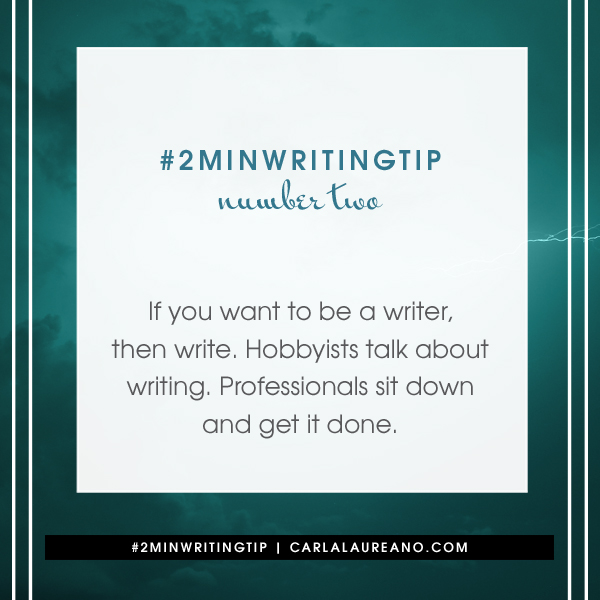#2MinWritingTip – Just Write

There’s a misconception, even within the writing community, that fiction must be created under the influence of inspiration. That unless you’re gripped by the wild desire to create, what you turn out won’t be fit to be read.
The reality is much less mystical and far more practical. In fact, many days I look at writing the way I look at going to the gym. I don’t particularly feel like writing, but I’ve made the commitment to myself and I know it’s the only way to reach my long term goals. Therefore, I apply the BIC Principle (Butt-in-Chair), turn off all my distractions, and I sit there until I hit my word count goal for the day. It’s not glamorous, but it’s how I’ve been able to write nine books for publication in the last five years. I’ve written sick, exhausted, sleep-deprived, and chronically ill. I’ve written with distractions, while on vacation (I don’t recommend this, by the way), late at night, early in the morning, and everywhere in between. Much of that time I didn’t feel inspired. But the miracle of creation is that everything we need to get our work done exists within us all the time… it’s often just a matter of applying the discipline to get it out.
[bctt tweet=”Everything we need to get our work done exists within us all the time… it’s often just a matter of applying the discipline to get it out. #2MinWritingTip”]
It’s easy to say, however, and not quite as easy to do. Over the last several years I’ve found a few things to be helpful in racking up the word count and minimizing the procrastination.
- Make a reasonable goal and then add 10%. When we make goals, we have the tendency to shoot low just to make sure we’ll hit it. However, when you shoot high, even if you don’t hit that goal 100% of the time, you’re likely to be ahead of where you were if you had gone with a lower number. Choose a daily or weekly word count goal. If that’s too intimidating, count it in pages. (A page is roughly 250 words.) And once you make a commitment, stick to it. If you’re on a roll, overshoot your goal. It gives you cushion in case you fall short one day.
- Make your manuscript your first writing priority. When you get to your scheduled writing time, open your file or your notebook and get going. Don’t blog about writing. Don’t crack a craft book. Definitely don’t check Facebook, even under the guise of building platform. Those things come after your word count goal for the day. Make sure you’re giving your first and best energy to your most important task. For a writer, that’s always creating new work.
- If you find your routine difficult to stick to, enlist someone to keep you accountable. Writing friends are awesome for cheering you up after a bad review or commiserating about how hard the process sometimes feels. They’re also great at keeping you accountable to your commitments. If I’ve told a friend I need to write 2500 words today, I know they’ll check in with me later to make sure I’ve actually done it. I don’t know about you, but I don’t like admitting I’ve slacked off… but I do like being able to say I’m already done for the day.
- Reward yourself. If #3 sounds too harsh, you may respond better to the carrot than the stick. Pick a reward for meeting your weekly goals, whether it be a Frappuccino, a visit to the nail salon, or a trip to the bookstore. Having something to look forward to at the finish line can sometimes give you the boost you need to get going.
Whatever combination of the above tips you implement, I’ll leave you with my favorite Louis L’Amour quote: “Start writing, no matter what. The water does not flow until the faucet is turned on.”
[bctt tweet=”Start writing, no matter what. The water does not flow until the faucet is turned on.” #2MinWritingTip #amwriting” url=”yes”]

Chanel Monroe says:
Great advice! It’s hard to get out of your head and just focus on your goals. But it is a discipline and these are great practical applications to help stay on task. Thanks!
On April 26, 2018 at 9:16 am
Carla says:
It can be difficult, but like anything else, it gets easier with practice! My ballet background helps with this… you take class every morning whether you feel like it or not. And eventually, it becomes so second-nature that you don’t even question sitting down to write. But it’s definitely a shift in mindset.
On April 30, 2018 at 1:06 pm